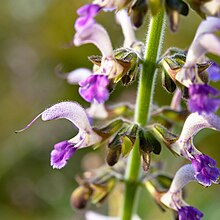Salvia bowleyana (southern danshen; in Chinese: nan dan shen) is a perennial plant native to China, south of the Yangtze River, growing on hillsides, beside streams, in forests, and in valleys between 30 and 9,600 metres (98 and 31,496 ft) elevation. It is used medicinally in China in the same way as Salvia miltiorrhiza[1] and is often confused with it. Salvia miltiorrhiza's common name is "dan shen", while S. bowleyana's is "nan dan shen", which means "southern dan shen".[2]
| Salvia bowleyana | |
|---|---|

| |
| Scientific classification | |
| Kingdom: | Plantae |
| Clade: | Tracheophytes |
| Clade: | Angiosperms |
| Clade: | Eudicots |
| Clade: | Asterids |
| Order: | Lamiales |
| Family: | Lamiaceae |
| Genus: | Salvia |
| Species: | S. bowleyana
|
| Binomial name | |
| Salvia bowleyana | |
Salvia bowleyana grows up to 1 metre (3.3 ft) tall, with flowers that are purple to purple-blue.[3]
Notes
edit- ^ Kintzios, Spiridon E. (2000). Sage: The Genus Salvia. CRC Press. pp. 15–16. ISBN 978-90-5823-005-8.
- ^ Foster, Steven; Chongxi Yue (1992). Herbal emissaries: bringing Chinese herbs to the West : a guide to gardening, herbal wisdom, and well-being. Bear & Company. p. 126. ISBN 978-0-89281-349-0.
- ^ "Salvia Bowleyana". Flora of China. eFloras.org. Retrieved 2009-03-27.